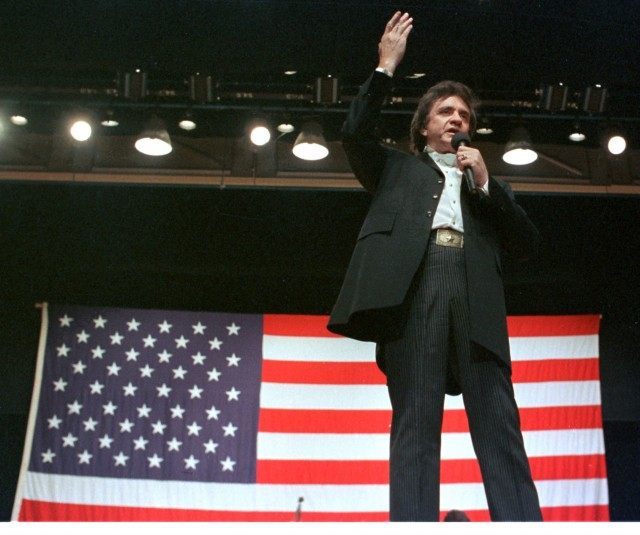NEW YORK (AP) — If only every iconic musician could have a final act as heartening as Johnny Cash’s.
His late-career revival boosted his spirits and was a memorable bookend for his work, and the story behind it lifts “Johnny Cash: American Rebel,” a two-hour CMT documentary that premieres Sept. 12 at 9 p.m. EDT, on the 12th anniversary of Cash’s death at age 71.
While his romance with June Carter and 1960s heyday are entertaining to revisit, the story is familiar to much of America through the 2005 feature film, “Walk the Line.” What happened after that curtain fell is lesser known: Cash’s career foundered in the 1970s and 1980s, he was dropped by his record company, fell back into drugs. Finally, as recounted by John Mellencamp in “American Rebel,” he had resigned himself to a musical graveyard of performing in Branson, Missouri.
Yet when rap and hard rock producer Rick Rubin began looking for a specific challenge, to work with a consequential musician whose career had fallen on hard times, his interests aligned perfectly with Cash’s. The first of the minimalist series of “American Recordings” was released in 1994 and continued for the rest of Cash’s life.
Cash’s daughter, Rosanne, admitted to trepidations when the long-haired, bearded, guru-like Rubin connected with her father.
“Dad had been brought a lot of ridiculous ideas, some of which he had tried. He was kind of flailing about,” said Cash, who was interviewed in the film. Her first thoughts: Oh, no. Not again.
“I met Rick and I saw how they worked together and I was really heartened,” she said. “Then, of course, I saw what they did together and I felt the whole family owed Rick a great debt. Rick came in and reminded him of who he was, revitalized him and loved him like a brother. They loved each other like brothers.”
The film includes two minutes of Johnny’s chilling video for “Hurt,” and Kurt Loder’s interview with Cash about his musical resurgence. What comes across in “American Rebel” is how that period stripped away the mystique and trappings of stardom to return Cash to his first love — music.
“He has this reputation as this outlaw, this tough guy, this against the grain person, and there was an element of that in his personality,” said Jordan Tappis, co-director of the CMT documentary. “More than anything, Cash was a sensitive artist … When I investigated him, what would shine through was the artistic side of him, the sensitive guy who liked to stay up late taking photographs and writing in his journal, reading poetry and writing poetry.”
Tappis and Executive Producer Derik Murry earned the cooperation of Cash’s family, which opened the door to a rich trove of interviews and archival material. Besides Rosanne, the film includes interviews with Johnny’s son John Carter Cash, June’s daughter Carlene Carter, and musicians Sheryl Crow, Eric Church, Merle Haggard, Kris Kristofferson, Willie Nelson, Kid Rock and Cash’s former son-in-law Rodney Crowell.
More importantly, that cooperation didn’t wrap the film in gauze, with a family reluctant to show a balanced portrait. The trials — the drug addiction, the divorce to Rosanne’s mother — are discussed alongside the triumphs.
“Johnny himself was not afraid of being open and honest about his flaws,” Tappis said. “I thought it was important not to whitewash things.” He believes Cash’s openness was one of the reasons fans were drawn to him. As Rosanne said: “Honesty is the most compelling part of the man.”
That’s evidently an inherited trait. Rosanne, who won three Grammy Awards earlier this year for her most recent album “The River and the Thread,” is remarkably understanding in the film about things many daughters would have a hard time forgiving. Her father’s addiction to amphetamines, for example, “didn’t start because he was looking to get high,” she explained. “It started because he was trying to do his job.”
That’s not to say the path to understanding was short or easy.
“You gain perspective as you get older and I saw that he and June were meant to be together and I accepted it,” she said. “It’s not to say that I didn’t suffer. I did. That still rings about in some ways. It made me who I am. I had a dad who was absent a lot and was a drug addict. A lot of people have that and it plays out in a similar way for everyone.”
Twelve years after his passing, she said, “I miss the conversations, talking about all of the things we talked about, music and politics, other people and travel and whether we could get one of his grandchildren married off to Prince William.
“That was a late conversation of ours,” she said, laughing about an unrealized dream.
___
Follow David Bauder at twitter.com/dbauder. His work can be found at http://bigstory.ap.org/content/david-bauder

COMMENTS
Please let us know if you're having issues with commenting.